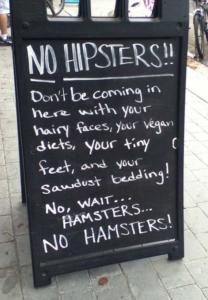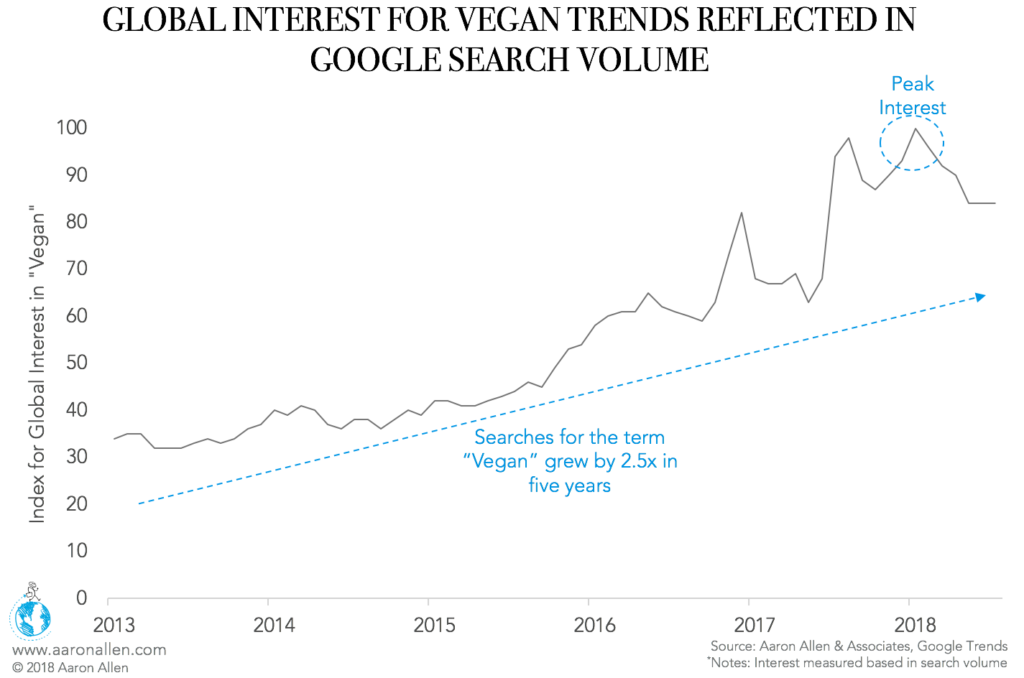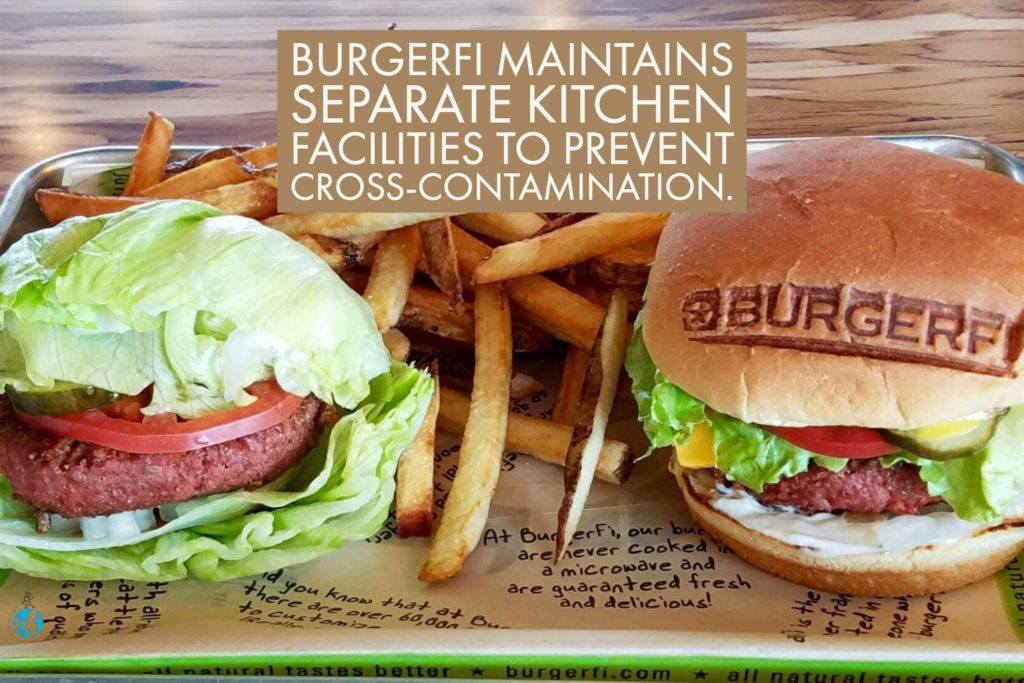No meat, dairy, eggs, seafood, or any sort of animal byproduct. For the majority of the United States, this seems like a pretty outrageous diet to follow, but for vegans, it’s a way of life — and the number of people choosing plant-based diets, whether as vegans or vegetarians is growing — as are the number of vegetarian and vegan restaurants.
Despite their numbers, the amount — not to mention the appeal — of veggie-friendly options on chain restaurant menus is mostly underwhelming. It’s time for restaurants to shift their menu options and cooking methods to serve this growing population.
A Global Movement
In 2009, less than 3% of the U.S. population identified as vegan or vegetarian. As of 2017, 6% (19.3m) follow a vegetarian lifestyle, with 1m of these Americans identifying as vegan. All over the world, other countries are following the same trend:
- 540,000 vegans in the U.K. (a 350% increase in the last 10 years)
- 3m vegans in Germany
- 60,000 vegans in Italy
- 400m vegetarians in India
In 2016, Google searches for the word “vegan” increased 90%. With documentaries like What the Health?, Food Inc., and Forks Over Knives available to viewers, an interest in vegan and vegetarian lifestyles has motivated many curious diners to adopt healthier eating habits.
What better time to put these habits into practice than the start of a new year? Beginning in 2014, a movement known as ‘Veganuary’ found its way into the mainstream, inspiring people to try to go vegan for the whole month of January. In its first year, only 3,300 participants signed up. Fast forward to 2018 — an incredible 168,500 people from 165 countries took part, with 82% sticking with the diet for the whole month and 62% permanently committing to a new lifestyle.
Why Vegan?
The internet has provided an infinite amount of information about the mistreatment of animals, environmental destruction, and adverse health effects that have been directly linked to animal protein-based diets. The resource-intensive practice of animal agriculture has also been identified as a major contributor to global climate change. It takes 11 times as much fossil fuel to produce one calorie from animal protein as it does from plants. Globally, we use almost a third of our land to raise animals and, in the U.S., nearly 50% of water use goes to animal farming. A plant-based diet simply asks much less of the environment than a meat-based diet.
What Can Vegans Eat?
Just like everyone else, vegans require carbohydrates, fat, protein, vitamins, and minerals. The key difference here is that none of these are derived from animals or animal byproducts.
There are many misconceptions circulating about the diet, leading to some confusion regarding what vegans actually eat. Some people believe:
- Salad is the only food vegans eat.
- Eggs are vegetables.
- Being vegan is about eating less or smaller portions.
These myths obscure the fact that the vegan lifestyle is about eating with integrity, empathy, and personal health in mind. Society as a whole has become more conscious of what they consume, and whether they follow a certain diet or not, their food choices follow the same principles as veganism. Restaurant menus, however, do not.
Vegans Eat at Non-Vegan Restaurants, too
Vegans regularly don’t have a choice about where they eat: when traveling with friends, celebrating birthdays, or dining out with coworkers, they may not get to pick the venue. The options at non-compliant establishments are weak and bland. The best you can get from most chain restaurants is a house salad with only one dressing option, no croutons, and no cheese. Don’t get too excited — it’s just a bowl of romaine with tomatoes, shredded carrots, and onions.
Creating a Culture of Rejection
 When guests read a menu and see no plant-based options available, it feeds into the idea that vegans can’t eat anything. “Those poor vegans! They must be so sad and nutrient deficient!”
When guests read a menu and see no plant-based options available, it feeds into the idea that vegans can’t eat anything. “Those poor vegans! They must be so sad and nutrient deficient!”
Friendly jokes repeated enough start to sound unfriendly. Those who choose to eat differently should never feel unwelcome or ostracized by friends or family. Restaurants are spaces meant for connection and communication, but being unable to order anything but a plain salad makes many vegans feel excluded and unheard.
Treat it as an Allergy
Almost everyone loves a french fry, but most casual and fast-food dining spots share their fryers with meat. Cross-contamination is a serious issue in restaurants and can create food-borne illnesses and allergy attacks. Cooking the already limited vegan options with the foods and oils vegans have taken out of their diets can harm them in similar ways. Reintroducing foreign food into the body can lead to nausea, vomiting, and diarrhea.
Some restaurants have taken the initiative and separated grills and fryers for guests with special dietary needs. Popular burger chain BurgerFi has a separate area in the kitchen dedicated to the 100% plant-based Beyond Meat burger patty that was added to their menu in the summer of 2017.
Meet the New Meat
In response to the growing demand for more sustainable foods, the creation of lab-grown and plant-based meats has proven to be quite popular. Meat substitutes like tofu, tempeh, seitan, and textured vegetable protein are estimated to have a market value of $4.63b as of 2018. By 2020, they are projected to reach a value of $6.43b, at a compound annual growth rate of 6.8%.
Peas may be small in size, but, in the market of plant-based alternatives, they are mighty. They’re the main ingredient in Beyond Meat products, which has been backed by investors such as Bill Gates and Tyson Foods, the largest meat producer in the United States. Ripple, a plant-based dairy-free milk made from peas, has raised $43.6m to create and sell their products, which are already available at Target, Whole Foods, and other grocery stores nationwide.
Beyond Meat, Gardein, Field Roast, and Tofurky rank as the most popular vegan meat brands for their exceptional similarity to the taste, texture, and smell of animal-based meat. Yard House, a sports bar chain specializing in craft brews and classic American eats, has reserved an entire section of their menu to Gardein’s meatless products that satisfy vegans and vegetarians.
What You Can Do
Some of vegans’ favorite U.S. brands — Ben & Jerry’s, Chipotle, and Starbucks — have rolled out some seriously awesome animal product–free items. Domino’s in Australia has added vegan cheese to their menu; Burger King in India serves four variations of veggie burgers; and McDonald’s is dishing out their new McVegan in Sweden and Finland.
With so many plant-based alternatives to meat and dairy available on the market, it’s almost too easy to incorporate them into existing menus. Consider these popular brands:
GrubHub, a well-known meal delivery service, saw a 19% increase in popularity of vegan orders in 2017. The demand is growing, but where is the supply? If more options become available at larger chain establishments, they could potentially sell an additional 39 meals per day per restaurant just to vegans and vegetarians.
There’s a radical shift in food and food technology happening now, and it’s creating a palate for plants. How will you feed it?
ABOUT AARON ALLEN & ASSOCIATES
Aaron Allen & Associates is a leading global restaurant industry consultancy specializing in growth strategy, marketing, branding, and commercial due diligence for emerging restaurant chains and prestigious private equity firms. We work alongside senior executives of some of the world’s most successful foodservice and hospitality companies to visualize, plan and implement innovative ideas for leapfrogging the competition. Collectively, our clients post more than $200b, span all six inhabited continents and 100+ countries, with locations totaling tens of thousands.



